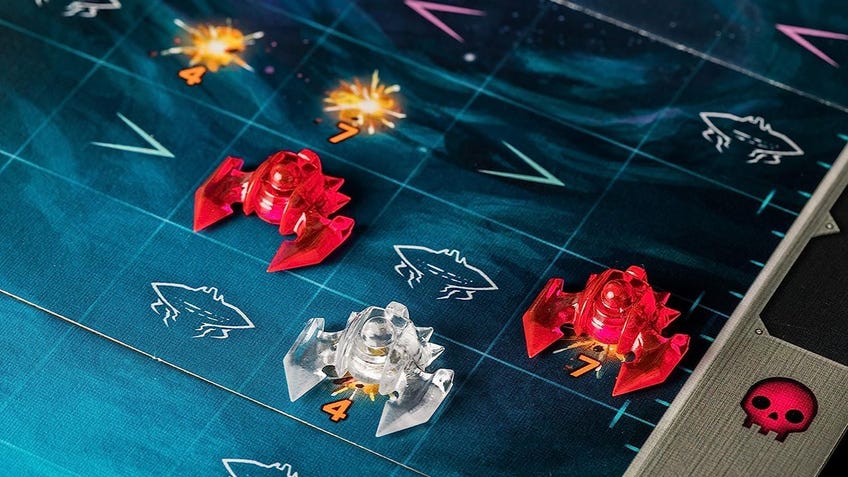9 best solo board games for single-player fun
Rollin’ solo.
The best solo board games date back centuries, with games like Solo Noble or Solitaire. Over the years, several board games have offered “optional solo play,” but in more recent years, designers and publishers have started releasing dedicated solo experiences as well.
Maybe you’re having trouble getting friends together. Maybe your power has gone out, and you’re all alone. Or maybe you’re just looking for a change of pace in your private time. Whatever the reason, one-player board games are a terrific way to have some solitary fun, and a great workout for your brain as well.
Best solo board games
- Exit: The Game
- Arkham Horror
- Space Invaders
- Turing Machine
- Onirim
- Friday
- Final Girl
- Resist!
- Under Falling Skies
There’s something about setting up the board, learning a set of rules and taking time to yourself, shutting off social media and all other distractions that leads to a far more emotionally satisfying and intellectually stimulating experience than your typical video game.
If you’re looking for a good place to start your own single-player tabletop experience, here’s our recommendations for the best solo board games.
1. Exit: The Game
This escape room-in-a-box lets you knuckle down on puzzles
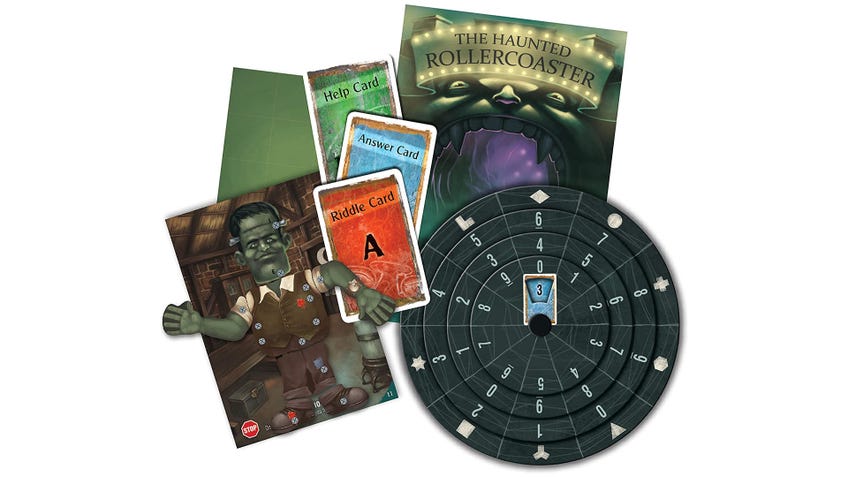
The Exit: The Game series offers an “escape room-in-a-box” experience, where players solve a series of puzzles that involve entering codes into a code wheel, which in turn leads to an answer deck of cards that tell them if they got the solution right.
A typical Exit game can take between 45 minutes to two hours, depending on how quickly players can clue in - or if they opt to take a peek at a solution deck of cards that offers hints and even complete answers.
Playing these games solo neatly eliminates the main problem with escape rooms in general: feeling bored or stressed. Solo play means you don’t have other people in the room waiting politely for their chance to be useful or participate.
If there’s one big issue with Exit, it’s that the games are usually designed to be single-use - both because the puzzles, once solved, don’t change on replay and because solutions sometimes involve altering the game’s contents. That could mean folding, cutting or drawing on different pieces, which feels a bit wasteful.
Still, with a large library of Exit games and most costing under £15, they make for an affordable one-off challenge.
Buy Exit: The Game on Amazon US and Amazon UK.
2. Arkham Horror
The complex Lovecraftian classic is much more playable in solo mode
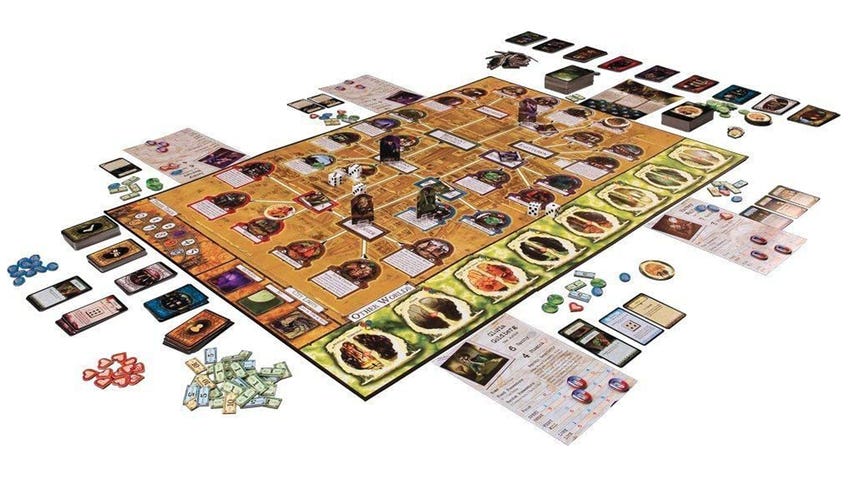
The granddaddy of board games based on the Cthulhu Mythos of author H.P. Lovecraft, Arkham Horror is complex and time-consuming. It incorporates many roleplaying-style mechanics, including character statistics, inventories and monsters and final bosses to fight against.
Players take on the role of investigators in the fictional town of Arkham in 1926, as they attempt to defeat or prevent the emergence of a Great Old One, an ancient godlike entity that will destroy humanity if it is not stopped.
Because of the wide variety of options and actions players can take on for their investigators, a Arkham Horror strays into RPG territory, with a single game potentially lasting hours.
This is why solo play of Arkham Horror can be surprisingly rewarding. By limiting the number of players, you also end up reducing turn times. This does make the game harder if you stick to solo-ing a single character, too, as it will hasten the “doom track” that leads to the Old One’s emergence.
However, you can easily work around that by simply playing multiple characters yourself, which also means you don’t have to demand an hours-long commitment from a regular gaming group.
Buy Arkham Horror on Amazon US and Amazon UK.
3. Space Invaders
Quick and easy to set up and play by yourself
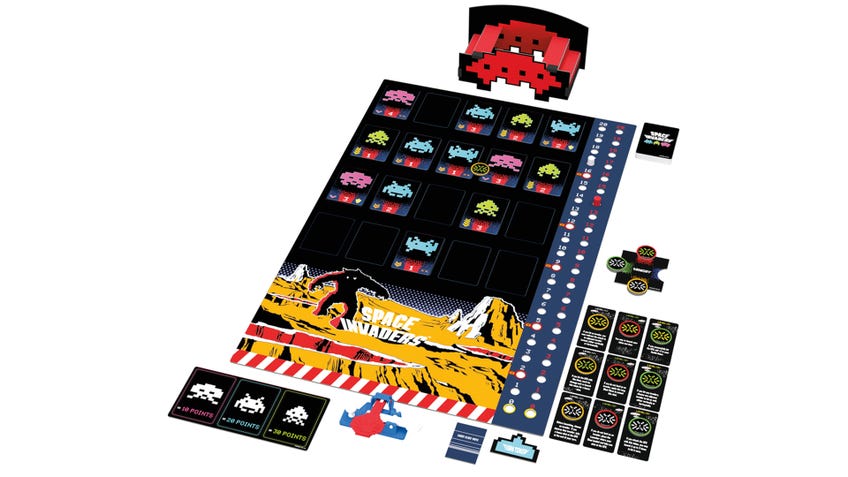
At the opposite end of the complexity scale is Kane Klenko’s take on Space Invaders. This dexterity game loosely adapts the gameplay of the famous arcade game by swapping a joystick for a plastic launcher that players use to fling tokens on a long, arcade cabinet-style board. Alien ships are represented by a deck of cards; when a token successfully lands on a card, that ship is (usually) destroyed.
If that sounds familiar, you might be thinking of Flip Ships, Klenko’s first foray into Space Invaders-style gameplay. In Flip Ships, however, there was no plastic launcher. While that might not seem like much of a big deal, it’s immensely more satisfying to machine-launch tokens, rather than flipping them, quite literally, towards your enemies.
There’s some light strategy involved in what kind of token you launch, with some having different effects on the alien invaders, but generally, this is an easy solo board game to set up and go.
Buy Space Invaders on Amazon US and Amazon UK.
4. Turing Machine
Give your brain a Sudoku-style daily workout
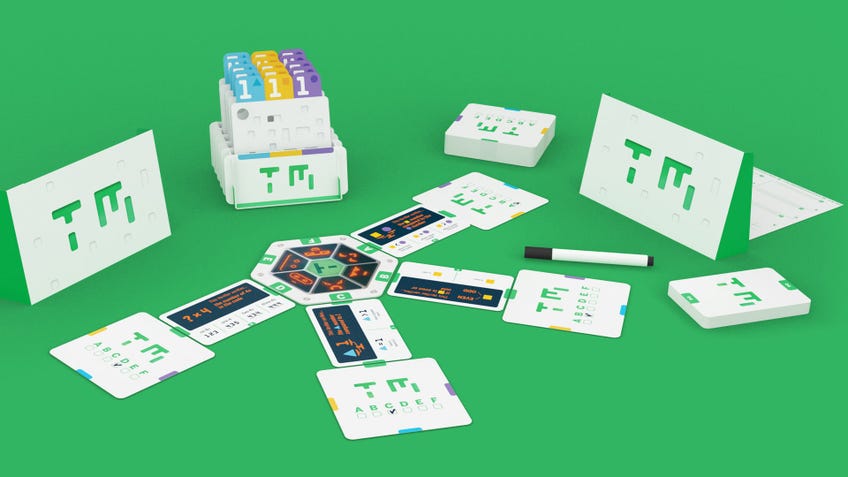
The final entry on this list initially designed for multiple players with optional solo play, Turing Machine is a logic game where the objective is to be the first to get to a secret code number. Players accomplish this by formulating questions for the machine itself - a selection of cards with various operational clues.
These clues might take the form of something like “test if the number in the first spot is greater than 4” or “test how many 5s are in the code”. An incredibly well-designed system of punchcards is then lined up alongside a code card, and a checkmark or an X verifies if the player’s query tested positively or not.
Turing Machine has DNA from board games like Mastermind, but it more closely resembles Sudoku or Wordle. In that same vein, the makers of Turing Machine have a dedicated website where players can access near-infinite puzzles for free, including daily challenges, as well as a printable book of hundreds of secret codes for offline play.
It’s a fantastic solo board game for people who love logic and programming.
Buy Turing Machine on Amazon US and Amazon UK.
5. Onirim
A solitaire-like experience with built-in expansions
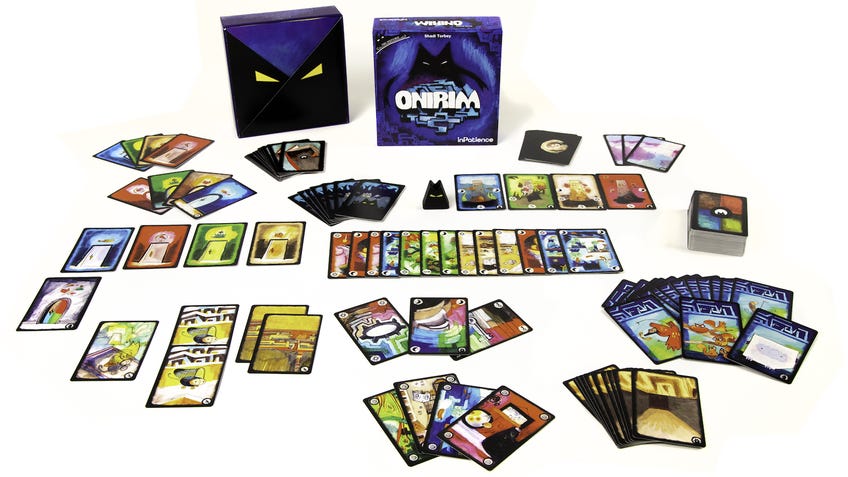
The first explicitly solo board game on this list is also the only one that features an optional two-player mode. Onirim is a card game that bears some resemblance to solitaire, with the objective to find eight coloured doors in a large deck.
Players arrange cards on the table from left to right. If they manage to arrange three cards of the same colour together, a door is unlocked. The solitaire resemblance comes in that each card, on top of having its own colour, also has its own symbol, with players needing to alternate symbols as they place cards.
That’s just the basic game, however. Onirim comes packaged with seven optional expansions, compatible with each other and the basic game. These expansions offer new cards and more complex elements, giving Onirim a strong amount of replay value, as well as the ability to adjust the game to one’s personal skill and preference.
Several other single-player board games have been released by publisher inPatience in what it calls the “Oniverse,” including Castellion, Stellarion and Cyberion.
Buy Onirim on Amazon US and Zatu (UK).
6. Friday
Tricky to pick up, but speedy solo fun once it gets going
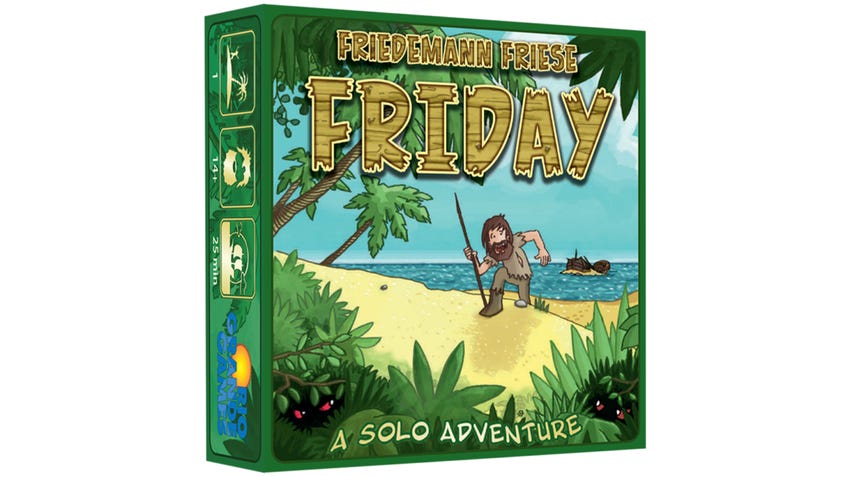
A solo deckbuilding game, Friday has the unfortunate distinction on this list of having the most confusing rulebook. This is a game for which there is absolutely no shame in consulting a YouTube tutorial.
Once picked up, however, Friday becomes a rapidly-paced experience where the player assumes the role of the eponymous Indigenous guide to the hapless Robinson Crusoe, who has washed up on your island. In a bid to reclaim your peace and quiet, you help Robinson become strong enough that he can take on some pirates, seize their ship and depart back to where he came from.
Robinson is represented by the player’s hand of cards, and three small decks are arranged to represent other aspects: the task you’re trying to accomplish, ageing effects from Robinson being stranded too long and new skills that Robinson can learn.
By accomplishing tasks, the player can shuffle out some of Robinson’s weak starting abilities in favour of stronger ones. It’s a tough game to win and a lot can happen to break poor Robinson along the way. Despite the difficulty both in the manual and in the game itself, however, Friday is a quick and fun little solo game, and, with the possible exception of Onirim, also the most portable on this list.
Buy Friday on Amazon US and Amazon UK.
7. Final Girl
Mix and match your setting, character and killer antagonist
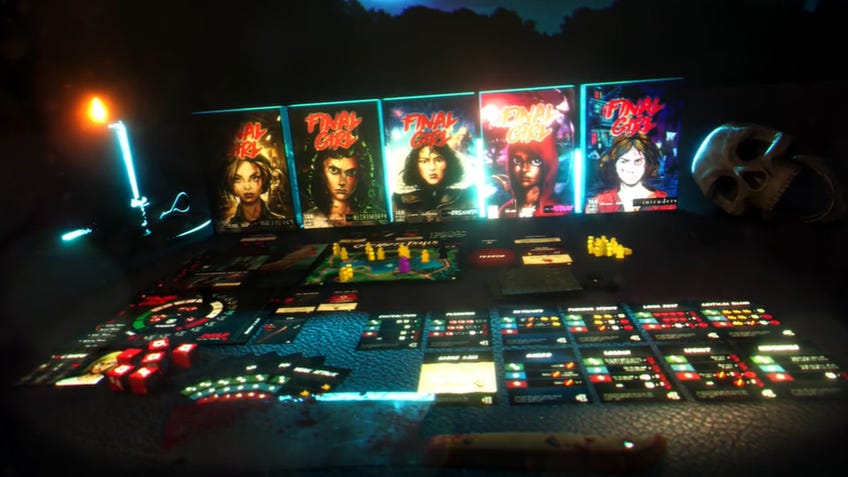
Based on the horror movie trope, Final Girl is a stylish and customisable game that puts players in the role of the titular final girl, fighting against a nightmarish killer. The game is sold in a minimum of two parts: a core box that contains essential components and any number of “feature boxes,” each of which provides a location for the game to take place, a killer to fight against and a final girl to play as.
Along the way players can find items and allies to assist them, but while they hunt around the location for these things, the killer is out there slaughtering victims. This grows the killer’s power - which means you can’t take forever to confront them or they’ll be impossible to overcome.
As a result, there’s a fair amount of strategy in Final Girl, particularly around how you choose to spend your time - a literal numerical stat in the game - but it never feels too dense. Once you get into the rhythm of the game, a win or a loss can come in as little as 15 minutes. It could also take upwards of an hour or more.
This variety can also be seen in the smorgasbord of killers, locations and final girls available. Two entire series of “feature boxes” have already been released, and a third is on the way. This does mean Final Girl can add up to being an expensive game to play if you want to maximise your feature box variety, but it also means there’s a huge amount of possibilities to try.
Buy Final Girl on Amazon US and Amazon UK.
8. Resist!
Fighting fascists with stylish artwork and tense gameplay
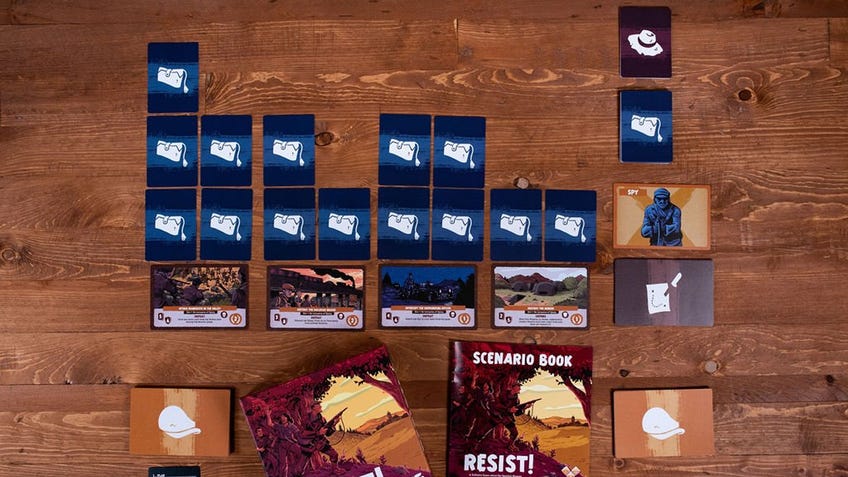
This card-based solo game from Spanish publisher Salt and Pepper Games dives into its nation’s history, as players take on the role of rebels fighting the regime of dictator Francisco Franco.
The player controls a starting hand of rebels, called maquis, who each have their own abilities. As the game starts, the player draws four random mission cards and selects one to go on, not necessarily knowing what enemies they might be up against. From there, it’s a numbers game, with the maquis adding up their stats in the hopes of beating enemy soldier stats and the mission itself.
In addition, the player can opt to have their maquis “revealed,” which usually buffs their stats, but they get sorted into a discard pile and are very difficult to retrieve.
With the player racing against attrition of their maquis pool, Resist! lives up to its name, feeling like a dire struggle against an overwhelmingly powerful enemy.
What really brings Resist! to life is the terrific artwork by Albert Monteys, who injects a wonderful amount of personality into the maquis with his illustrations. It’s that little extra touch that makes Resist! feel like a narrative experience on top of solid single-player mechanics.
Buy Resist! on Amazon US and Amazon UK.
9. Under Falling Skies
An easy-to-learn solo game that goes a long way
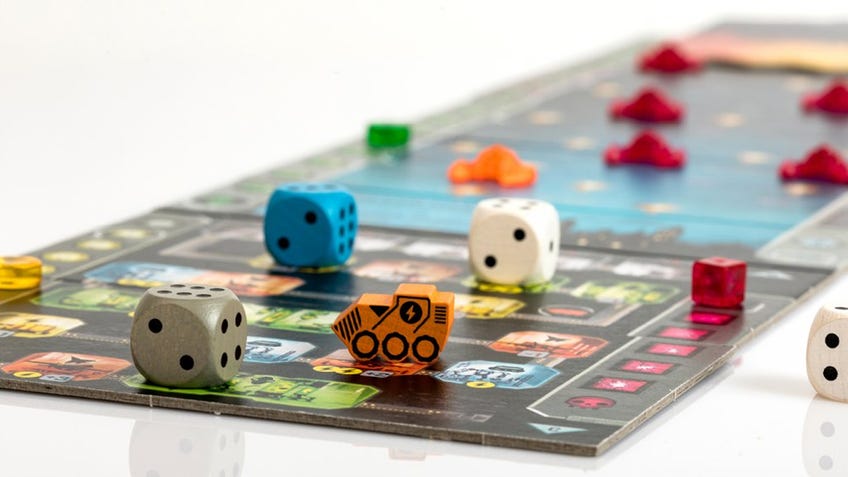
Under Falling Skies was the COVID-19-inspired brainchild of Czech Games Edition designer Tomáš Uhlíř. Originally conceived as a game players stuck in lockdown could print at home, the full release of Under Falling Skies upped the ante with nifty plastic and card components.
Players battle an alien invasion using a deceptively simple dice-rolling mechanic. Each turn, the player rolls five dice, two of which are white, and assigns these dice to rooms in their base, represented on the bottom of the game board. Higher dice values give higher bonuses from the rooms, but they also cause invading ships to descend towards the base faster.
This leads to some startling strategic thinking, as players have to balance enemy ship placement, base resources and their ultimate goal of raising their research level to the top tier.
Under Falling Skies takes the top spot on this list with its included campaign, which ups the ante from the base game with new mechanics and legacy effects that carry over from mission to mission while not permanently altering the game, so players can replay the campaign and use elements from it in regular games, too.
It’s a remarkably well-paced challenge that never feels unfair, but offers rewarding and stiff competition for its solo player.
